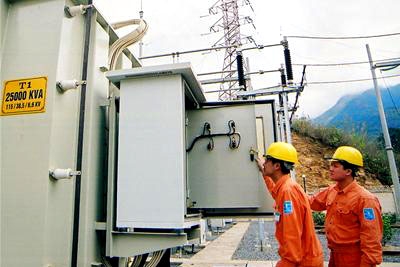EVN reiterates power price hike proposal
 |
| EVN’s losses are expected to be offset by gradual power price hikes over the coming years |
In early September, EVN asked for an increase in electricity price from that month, but several leading economists denied the need for it, saying that the proposal was inappropriate in the context of the country's rising inflation rate.
According to an EVN official, this time, all three elements, including fuel prices, foreign exchange rate and power outputs that affect power price calculations have increased over the past three months.
Under the Ministry of Industry and Trade’s regulations, EVN could hike power prices by a minimum of 5 per cent if the factors related to input costs report an increase of more than 5 per cent over three consecutive months.
As the Ministry of Finance has said power prices should not be amended on a quarterly basis to avoid a negative impact on the national economy, EVN has decided to seek approval to increase power price from November instead.
The latest power price hike was applied from March 1, 2011, raising the electricity rate by 15.28 per cent.
Currently, EVN is facing mounting losses and spiralling debts, which it claims is due to low retail prices.
The group’s debts to PetroVietnam have now surpassed VND10 trillion ($477.4 million).
In addition to its debts to PetroVietnam, EVN still owes over VND2 trillion ($95.5 million) to the state-owned company Vietnam National Coal-Mineral Industries Group (Vinacomin). This means that EVN’s total debts amount to over VND12 trillion ($572.9 million).
Apart from its debt problem, EVN is struggling to find capital for power projects.
The Ministry of Finance recently allowed EVN to calculate its losses and to offset the losses by gradually increasing power prices in the coming years.
If EVN is allowed to raise electricity price by 5 per cent per quarter, it could offset its losses by 2013.
What the stars mean:
★ Poor ★ ★ Promising ★★★ Good ★★★★ Very good ★★★★★ Exceptional
 Tag:
Tag:
Related Contents
Latest News
More News
- State corporations poised to drive 2026 growth (February 03, 2026 | 13:58)
- Why high-tech talent will define Vietnam’s growth (February 02, 2026 | 10:47)
- FMCG resilience amid varying storms (February 02, 2026 | 10:00)
- Customs reforms strengthen business confidence, support trade growth (February 01, 2026 | 08:20)
- Vietnam and US to launch sixth trade negotiation round (January 30, 2026 | 15:19)
- Digital publishing emerges as key growth driver in Vietnam (January 30, 2026 | 10:59)
- EVN signs key contract for Tri An hydropower expansion (January 30, 2026 | 10:57)
- Vietnam to lead trade growth in ASEAN (January 29, 2026 | 15:08)
- Carlsberg Vietnam delivers Lunar New Year support in central region (January 28, 2026 | 17:19)
- TikTok penalised $35,000 in Vietnam for consumer protection violations (January 28, 2026 | 17:15)






















 Mobile Version
Mobile Version